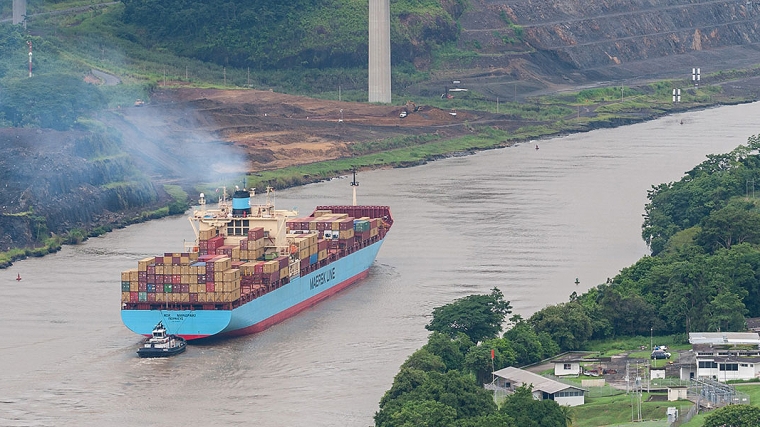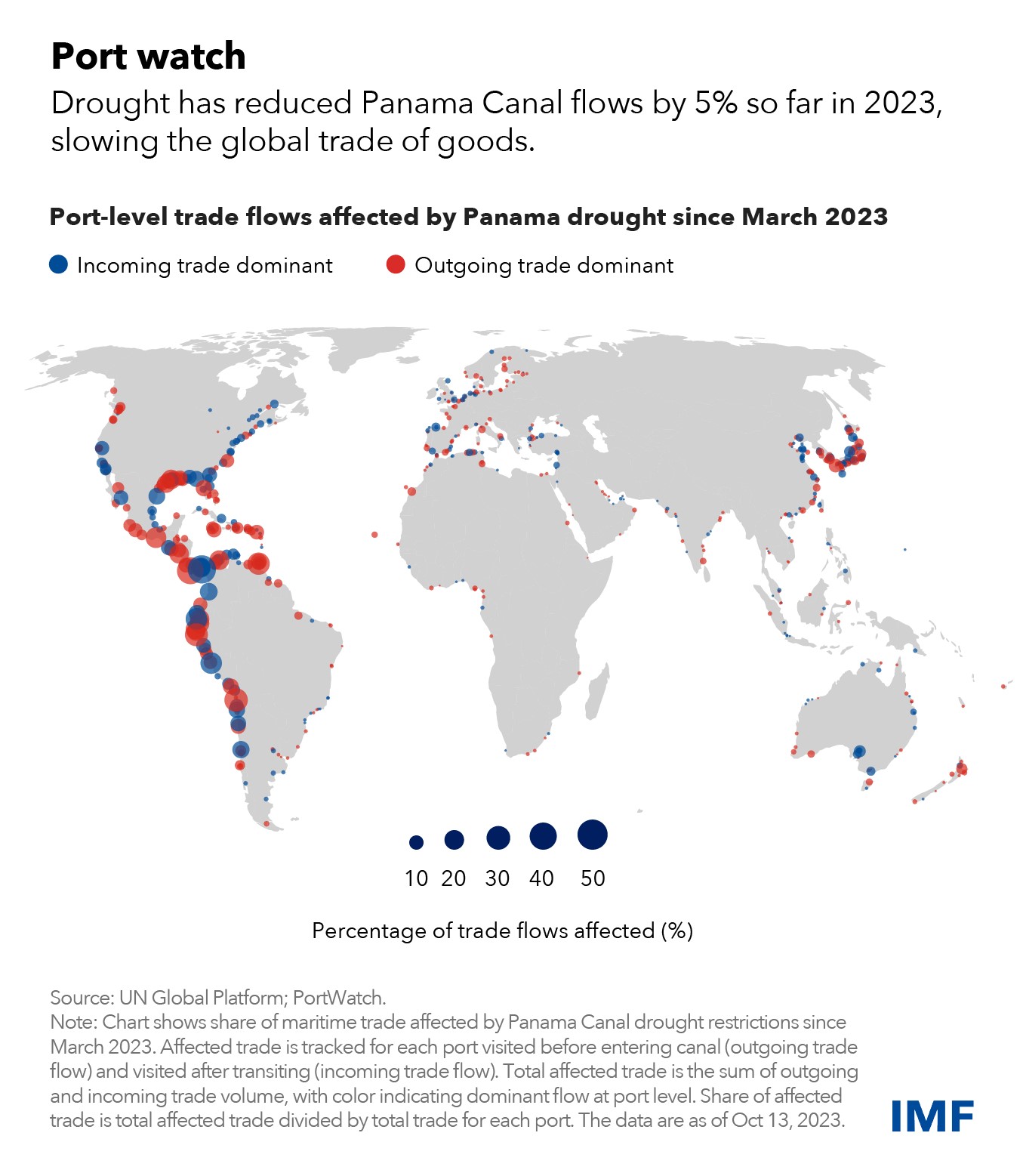
By Serkan Arslanalp, Robin Koepke, Alessandra Sozzi, and Jasper Verschuur
Around 1,000 ships pass through the Panama Canal each month carrying a total of over 40 million tons of goods—about 5 percent of global maritime trade volumes. But water levels in this vital link between the Atlantic and Pacific oceans have fallen to critical lows because of the worst drought in the canal’s 143-year history.
Drought restrictions imposed amid insufficient rainfall at the Gatún Lake, which feeds the canal, have reduced throughput by some 15 million tons so far this year. Ships have faced an additional six days in transit. The authorities are exploring strategic options to boost the water supply in the canal.
As the Chart of the Week shows, ports in Panama, Nicaragua, Ecuador, Peru, El Salvador and Jamaica are suffering most from these delays, with 10 percent to 25 percent of their total maritime trade flows affected. But the drought’s effects are felt as far away as Asia, Europe and North America. The drought will hamper trade for months to come, with canal passages set to halve to 18 ships per day by February, down from 36 in ordinary times. Economies reliant on the canal for trade should prepare for more disruption and delay.
Amid climate change, droughts, floods, tropical storms and other disasters are becoming more common and pose a serious threat to maritime infrastructure. With PortWatch, an open platform launched today by researchers from the IMF and the University of Oxford, policymakers can prepare for trade disruptions caused by shocks like climate extremes and decide how to respond to them.
The platform uses real-time satellite data to track nearly 120,000 cargo ships and tankers worldwide—over 99 percent of global maritime trade. It provides daily estimates of trade volumes at 1,400 ports and more than a dozen pinch points, such as the Panama Canal.
PortWatch simulates international spillovers from a port closure and plots disruptions to onward supply chains on an interactive map. It enables climate scenario analysis, providing modeled risk estimates for a range of climate extremes. PortWatch also sends alerts on potential and actual trade disruptions after major disasters.
—This blog was co-authored by the PortWatch team, which includes Parisa Kamali. See the press release: IMF and University of Oxford Launch “PortWatch” Platform to Monitor and Simulate Trade Disruptions.
Serkan Arslanalp, Robin Koepke, Alessandra Sozzi, and Jasper Verschuur are all economists at the IMF. This article was originally posted here.
22 Comments
How will I get my plastic toys and fast fashion?
Amazon and Facebook Marketplace.
Oh...
Do you mean that stuff actually comes from somewhere? I though it just appeared on the doorstep because I was clever enough to swipe a screen.
Interesting article; goes with the other bottleneck: https://www.aljazeera.com/news/2023/1/9/cargo-vessel-ran-aground-in-egy… Complexity and just-in-time margins are entering a period of negative returns - I'm guessing insurance will be the reality-check.
Records show that lower water levels have been recorded in the early 80's and mid 90's, both El Nino cycles which is almost certain to be the factor now. That doesn't fit the narrative I know but I tend to prefer facts.
Even the IPCC AR6 states specifically that for droughts, floods and tropical storms "evidence is lacking or the signal is not present". Almost like PortWatch is trying to drum up some business.
https://www.ipcc.ch/report/ar6/wg1/downloads/report/IPCC_AR6_WGI_Chapte…
https://www.reuters.com/world/americas/panama-canal-water-levels-histor…
https://www.waterdiplomat.org/story/2023/10/panama-canal-experiences-lo…
https://www.newsroompanama.com/news/water-crisis-panama-lakes-at-lowest…
I think - and have for a long time, reading your posts - that you select what supports your desired narrative. Good luck with that.
as for Profile.... he takes selectivity to a new level.
Profile's link is to the IPCC WG1 report.
WG1 is responsible for the scientific basis to climate change. When wanting to understand the scientific - it is the IPCC working group chapter to go to.
Lots of people (including government officials, scientists (particularly from social sciences and/or those natural scientists wedded to the 'too hot' end of the projection spectrum) are trying to discredit the less alarmist faction. Many will cherry pick quotations from other chapters which directly contradict the findings of WG1.
In short, the battle you are having with Profile is an internal battle many within the IPCC and outside in academia are having.
All projections are falsifiable by their nature. Modelling has not served us well in many cases in the past. The IPCC's previous high end scenario has been found to be implausible (unlikely to occur) in the most recent AR6 WG1 report.
I recommend signing up to Roger Piekle Jr's blog. Best way to keep up with ongoing developments between IPCC Assessment Reports (ARs).
Curious that they didn't quote these bits...
https://www.ipcc.ch/report/ar6/wg1/chapter/summary-for-policymakers/#A.
A.1 It is unequivocal that human influence has warmed the atmosphere, ocean and land. Widespread and rapid changes in the atmosphere, ocean, cryosphere and biosphere have occurred
A.3 Human-induced climate change is already affecting many weather and climate extremes in every region across the globe. Evidence of observed changes in extremes such as heatwaves, heavy precipitation, droughts, and tropical cyclones, and, in particular, their attribution to human influence, has strengthened since AR5
And if you expand point 3....
3.1 It is virtually certain that hot extremes (including heatwaves) have become more frequent and more intense across most land regions since the 1950s, while cold extremes (including cold waves) have become less frequent and less severe, with high confidence that human-induced climate change is the main driver14 of these changes. Some recent hot extremes observed over the past decade would have been extremely unlikely to occur without human influence on the climate system. Marine heatwaves have approximately doubled in frequency since the 1980s (high confidence), and human influence has very likely contributed to most of them since at least 2006
A.3.2 The frequency and intensity of heavy precipitation events have increased since the 1950s over most land area for which observational data are sufficient for trend analysis (high confidence), and human-induced climate change is likely the main driver. Human-induced climate change has contributed to increases in agricultural and ecological droughts15 in some regions due to increased land evapotranspiration16
It's just physics. I can tell anyone how it works; three glasshouses and a passive-solar house tell me what happens when you don't let as much low-grade heat out, as you get high-grade energy in. And sailing tells me that weather systems are getting stronger, more frequent, and pushing beyond their usual seasons/tracks.
The last 10,000 years of temp - and take off point being the industrial age, does it for me.
Peterson debunked.
Summary for Policy Makers documents are are written by politicians. "Negotiations occur over wording to ensure accuracy, balance, clarity of message, and relevance to understanding and policy."
If you want the scientific basis you have to read the working groups papers. Even then the WG report are selective about what they cite and weight. Pielke goes in to detail of this aspect - see Kate link.
Also, the IPCC does not investigate natural climate change - only areas which it deems man made.
I see Newsroom are trying to crowd fund Rod Oram to Dubai to cover COP28.
If it's that much of an emergency wouldn't you just zoom the fricken conference? Clearly not enough to get in the way of a good junket. Feed the +++ers crickets and bugs at least, no meat or booze.
Straw-man comment.
An old chestnut. The joke is, that Oram is our Monbiot - a true believer that we can survive this unscathed, as long as we....
He never goes near the rest of the Limits to Growth facets, to my knowledge.
That's from the Summary for Policymakers - very interpretive language, sometimes misleading/misinterpreted - for the AR6 report, it has come under a lot of criticism from some of the authors of the peer reviewed academic papers cited in the WG1 report..
My acquaintances in the game, consistently say the actual is outrunning the projected - they say that is because science is cautious, arse-covering.
I just go with the facts: record, record, record, record. Too consistent a trend to be rubbished.
Thank you for the link - he's on the right track. We should stop NOW - but we won't because we can't without dieoff and disruption. And we are past the point where we need to adapt; the die being already cast.
Well, you've got it very right about "in the game". Follow the money - as there's plenty of it!
- Adherence to alarmist, implausible, unlikely and unlawful sea level rise scenarios – has significant financial benefit to a wide number of bureaucratic and private sector elites in NZ society.
- These elites and the associated money streams are:
- Central government politicians via campaign contributions to those parties seen to be taking a ‘hard-line’ on climate change/GHG emissions reductions.
- Local government politicians via increased revenue/rates being needed to mitigate and adapt to climate change
- Media via increased revenue via alarmism ‘click bait’, disaster headlines
- Academia and CRIs via more government funded grants calling for more science that emphases how bad what might happen is. No one funds science that tells you “nothing to see here”.
- Private sector consultancy firms via lucrative contracts from councils to (District and Regional Councils) to write voluminous reports confirming how badly affected their area is.
- Central and local government officials (like planners and infrastructure managers) for whom coastal management and climate change is a ‘make work’ scheme; someone has to contract out all the work that needs to be done because we don’t have the technical expertise and are short staffed as well.
- Insurance companies via increased premiums in the short term – defended by science and local government maps outline effects that are implausible and unlikely to occur in the long term
- Put simply, climate alarmism is a money spinner for so many organisations that are extremely well funded already and benefiting further from the use of alarmist and implausible IPCC SSP5-8.5 high end emission scenario. To keep the money flowing – they need to ‘hang on’ to that scenario regardless whether the IPCC now finds it to be (quoted words used by IPCC), “implausible” and “unlikely to unfold”.
Gotta say PDK none of those links aren't very convincing.
The effect of more ships (800 extra this year) and more domestic consumption combined with El nino on a man made reservoir result in a completely predictable ending. Not disagreeing on climate change, just that this might not be one to hang that particular hat on.
The canal has been widened since then, so needs more water.
Please share evidence of your facts. Otherwise it’s just narrative…
No mention of the threat to US Navy. Panama canal of vital strategic importance to get your Navy where it needs to be in a hurry. Another threat to shipping security.
The Colombian cartels will be over the moon
The climate seems quite normal where I live. It's definitely colder than last year and we've had a lot of rain. About 10 years ago we had hardly any rain for 3 months.
Who remembers the 'experts' and the 'scientists' telling us we're running out of oil, the ozone layer was disappearing, that acid rain would destroy all crops and running out of water? There's a lot of very gullible people out there.


We welcome your comments below. If you are not already registered, please register to comment
Remember we welcome robust, respectful and insightful debate. We don't welcome abusive or defamatory comments and will de-register those repeatedly making such comments. Our current comment policy is here.